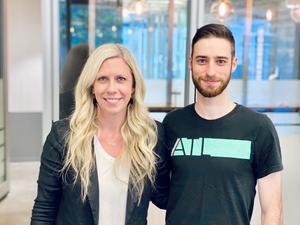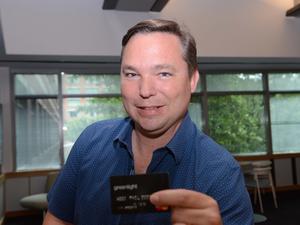
Dana Barrett is used to career changes.
She started as a web designer and coder. Then, she entered the media industry, doing daily business talk shows and moderating tech events. Before that, she owned a coffee and bookstore. In 2020, she ran for Congress.
Now she’s coming full circle, back into the technology field as a venture partner with Shadow Ventures, an Atlanta seed-stage investment firm that focuses on property technology, or proptech.
It’s both familiar territory and another new experience for Barrett. She's using her skills in real estate, communication and technology in her role as a startup mentor while also learning about the world of investing and gaining expertise in proptech.
Atlanta Inno: Why did you transition into media after working in the tech field? How is that experience helping you as a venture partner?
Dana Barrett: As I was moving through the technology ranks, there were often two sides to the technology business – people who could communicate on the sales and business side and the technologists. My sweet spot was bridging the gap between the two. I was a coder, so I knew how to design databases and write code but also how to communicate really well with clients. I felt like that could be used in the public arena to help the public understand technology that was coming down the pike.
That’s true of the investor world, too. While some investors are tech savvy and understand all of tech, others do not. Especially in proptech, which is all technology around real estate. For real estate developers in Atlanta, there's a natural fit to start investing in prop tech. Startups need to be able to talk to them in a less technical way when looking for investments.
Inno: What is your favorite part of working at Shadow Ventures so far?
DB: When I’m working with each one of these startups, I’m learning a whole new, detailed piece of technology. It’s fascinating.
And look at the $1.9 trillion infrastructure bill that’s in the news right now. If that bill passes, the amount of money that’s going to be going into building and technologies that support building is going to be phenomenal. This is an industry that’s been slow moving at adopting new technology, but I think the new money pouring in — for green building, bridges highways and all that — will be great for proptech.
Inno: Is proptech a big industry in the Atlanta innovation ecosystem?
DB: It’s not big anywhere yet. They didn't even really have the right terminology for it until recently. It hasn’t really been looked at as a sector, not in the way it is now. Atlanta has an opportunity to become a stronghold. Since there’s building all over the country, there isn’t necessarily a place that lends itself to becoming the home of proptech, like how Atlanta is the home of fintech because of all the banks and payment processors here. But we are in a real estate town, so I can see there being an interest from investors who understand real estate to move into proptech.
Inno: From your time plugged into the Atlanta tech ecosystem, how has it changed over the years?
DB: I’ve been in it since the late ‘80s. I just aged myself there, but a lot has changed since then. A lot of these objections about Atlanta as a tech town are starting to fall away, and people are taking Atlanta much more seriously. There have been some big wins coming out of Atlanta, and there’s more investment money here now than there ever was. There’s a lot of enthusiasm for entrepreneurship and tech in general.
We’re well positioned for the next decade. Eventually it’ll just be automatic that when people are talking about technology, startups and investments, Atlanta is a town they’ll mention.
Inno: What are the biggest challenges as Atlanta becomes a tech town?
DB: Politically speaking, what we saw happening in the past several months with Georgia putting these voter restrictions in place. Businesses are turning around and saying that they won’t support that or do business here. Corporate America has a lot of power, and Georgia has prided itself for a long time on being a state that’s welcoming to business. If businesses aren’t coming here because of the laws, that’s a problem. That’s going to have an impact on the startup world, too. People aren’t going to want to come here. Young, vibrant startups are not going to want to live in a state that is racist or perceived as racist.
Inno: Do you have any advice to startup founders?
DB: Get somebody else to read your story or listen to your pitch that doesn’t know the technology. Some of these startups have really good stories, and they aren’t selling it. They’re in the weeds of what they’re doing, but they’re not telling the right story to get investments. Get some feedback on what you’re pitching.







